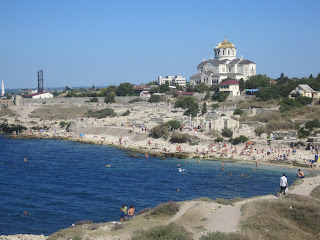Such a beautiful, warm, country and nation—Ukraine California Pacific Ocean , I needed to learn how to amuse myself in a Sea—what do you do without waves? Once I got into it, it felt like paradise. You could swim and float without the crashing of the waves and enjoy the bath-like warm temperature and see through the clear blue waters.
Then to visit the ancient town of Khersones—5th century BCE. Out of this world…Really…To stand on the cobble-stoned streets, and see the remnants of the Ancient Greek architecture, Ottoman mosques, and the renovated Byzantine Orthodox church---all overlooking the clear Black Sea.
Of course I was most intrigued by the town of Bakchisarai Crimea before the death of Jesus they were exempt from taking responsibility for his death like other Jews!
So my friend Tamara joined me for the journey to Crimea and after a 2-hour hike to this ancient village of Chufut-Kale St. Petersburg
When we took a trip to Crimea ’s riveria—Yalta village of Balaklava Soviet Union is something that your grandparents tell stories about. Something long ago in the past…. It reminded me of that first day in Crimea just about a week prior when I jumped from stone to stone along the Black Sea in Sevastopol Ukraine
Enjoy some pictures..

